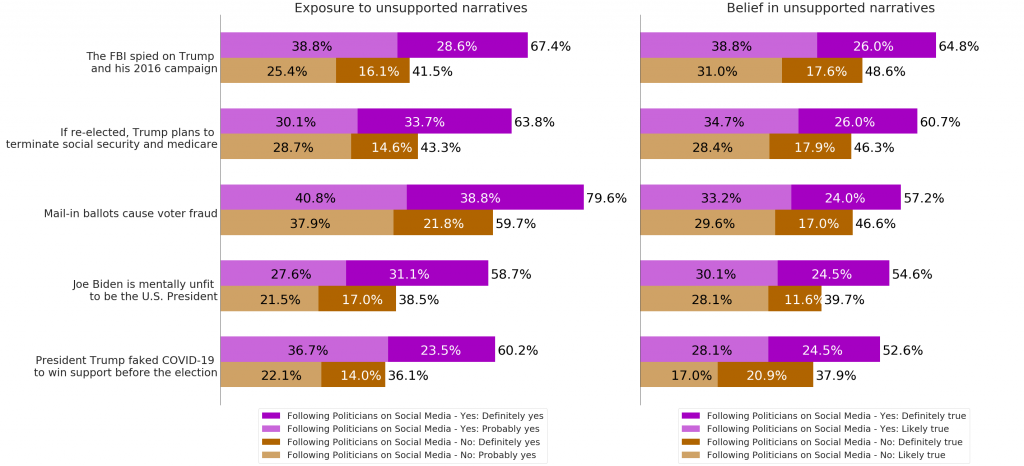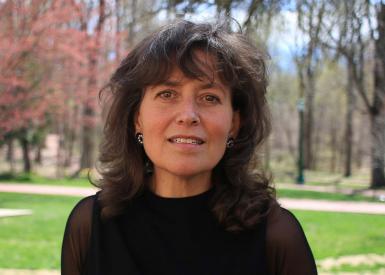Following politicians on social media exposes audiences to more misinformation
| Press Release: The Media School |
|||
|---|---|---|---|
| Contact: | Betsi Grabe Professor The Media School mgrabe@indiana.edu |
James Shanahan Dean The Media School jes30@indiana.edu |
|
For immediate release:
Oct. 28, 2020
BLOOMINGTON, Indiana — Social media scholars have known for some time that politicians are among the most prolific spreaders of misinformation on social media. The latest in a series of studies from Indiana University’s Observatory on Social Media shows the impact of that behavior on the fall 2020 presidential election. The new study found Americans who follow politicians on social media are more likely to be exposed to false stories and more likely to believe those stories than those who don’t follow politicians.
The latest survey, conducted from Oct. 15-24, looked at five different untrue narratives, including two that came from sources leaning left on the political spectrum and two that have remained constant throughout all four surveys. The continuing narratives addressed Joe Biden’s mental fitness and the validity of mail-in votes. The new narratives were: “The FBI spied on Trump and his campaign,” “If re-elected, Trump plans to terminate Social Security and Medicare,” and “President Trump faked COVID-19 to win support before the election.” The last two originated from left-of-center sources. Research data for the fourth survey can be found here.
Between 42% to 49% of survey participants had heard of the new narratives. About 55% thought the FBI might have spied on the Trump campaign, making that story the most believed of all false narratives across the series of studies. About 50% of participants believed the president might terminate Social Security and Medicare, and about 42% believed he might have made up his COVID-19 illness to help him win reelection.
Those who followed politicians on social media were more likely by up to 26 percentage points to be aware of false stories, and more likely by as much as 16 percentage points to believe those stories. The researchers concluded that “following politicians on social media is associated with higher rates of exposure and vulnerability to misinformation.”


“We are justified in pointing fingers to conspiracy theorists, bots and troll factory managers for polluting the social web with disinformation,” said Media School professor Betsi Grabe, a co-author of the study. “And it is unsettling to add to that list some of the people we elect to represent us. This finding from our study makes me join the growing choir of calls for media literacy efforts to help citizens recognize disinformation. It also adds weight to the urgency for debate on how to regulate disinformation.”
While false narratives stem more often from the right than the left, the new survey showed participants’ responses aligned with their beliefs, regardless of the origin of the story. Biden supporters were more likely to believe Trump would terminate Social Security and Medicare, and that he had faked his illness. Trump supporters were more likely to believe stories that cast Biden in an unfavorable light. Independents’ levels of belief consistently tracked between the two.
OSoMe is a joint project of the IU Network Science Institute (IUNI), the Center for Complex Networks and Systems Research (CNetS) at IU’s Luddy School of Informatics, Computing, and Engineering and The Media School at Indiana University, with support from the Office of the Vice Provost for Research at IU Bloomington. It is funded in part by support from the John S. and James L. Knight Foundation, a nonprofit focused on fostering informed and engaged communities.
About IU Research
IU’s world-class researchers have driven innovation and creative initiatives that matter for 200 years. From curing testicular cancer to collaborating with NASA to search for life on Mars, IU has earned its reputation as a world-class research institution. Supported by $854 million last year from our partners, IU researchers are building collaborations and uncovering new solutions that improve lives in Indiana and around the globe.

